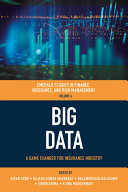

Most ebook files are in PDF format, so you can easily read them using various software such as Foxit Reader or directly on the Google Chrome browser.
Some ebook files are released by publishers in other formats such as .awz, .mobi, .epub, .fb2, etc. You may need to install specific software to read these formats on mobile/PC, such as Calibre.
Please read the tutorial at this link: https://ebookbell.com/faq
We offer FREE conversion to the popular formats you request; however, this may take some time. Therefore, right after payment, please email us, and we will try to provide the service as quickly as possible.
For some exceptional file formats or broken links (if any), please refrain from opening any disputes. Instead, email us first, and we will try to assist within a maximum of 6 hours.
EbookBell Team

4.0
36 reviewsBig data – unstructured and/or structured data being used to influence underwriting, rating, pricing, forms, marketing and claims handling and incentivize risk reduction – is a relatively recent development in the insurance industry, the data sets previously being too impossibly great to analyse through traditional methods. However, with the global capacity to collect and store data growing alongside advancements in AI and machine learning technology, insurers need to seriously evaluate their technology stacks to ensure they can remain competitive and respond to growing customer demand.
Striking a balance between the technical characteristics of the subject and the practical aspects of decision making, spanning from fraud analytics in claims management, to customer analytics, to risk analytics in solvency, the comprehensive coverage presented makes Big Data an invaluable resource for any insurance professional.
Providing high quality academic research, Emerald Studies in Finance, Insurance, and Risk Management provides a platform for authors to explore, analyse and discuss current and new financial models and theories, and engage with innovative research on an international scale. Subjects of interest may include banking, accounting, auditing, compliance, sustainability, behaviour, management, and business economics.